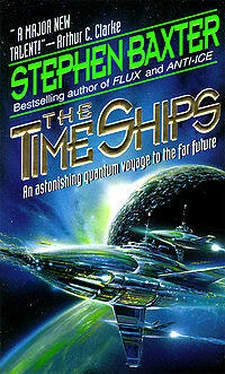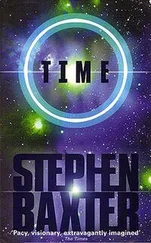A great weariness descended on me. I felt reluctant to lose consciousness once more — to leave myself defenseless — but I could see little prospect of staying awake forever. I stepped out of the ring of light and a little way away into the darkness, so that I felt, at least, some security from its cover of night. I took off my jacket and folded it up into a pillow for my head. The air was quite warm, and the soft Floor also seemed heated, so I should not go cold.
So, with my portly body stretched out over the stars, I slept.
I awoke after an interval I could not measure. I lifted my head and glanced around. I was alone in the dark, and all seemed unchanged. I patted my vest pocket; the Time Machine levers were still safely there.
As I tried to move, stiffness sent pain shooting along my legs and back. I sat up, awkward, and got to my feet feeling every year of my age; I was inordinately grateful that I had not had to leap into action to fend off a tribe of marauding Morlocks! I performed a few rusty physical jerks to loosen up my muscles; then I picked up my jacket, smoothing out its creases, and donned it.
I stepped forward into the light ring.
The trays, with food cartons and toilet pail, had been changed, I found. So they were watching me! — well, it was no more than I had suspected. I took the lids off the cartons, only to find the same depressing slabs of anonymous fodder. I made a breakfast of water and some of the greenish stuff. My fear was gone, to be replaced by a numbing sense of tedium: it is remarkable how rapidly the human mind can accommodate the most remarkable of changed circumstances. Was this to be my fate from now on? — boredom, a hard bed, lukewarm water, and a diet of slabs of boiled cabbage? It was like being back at school, I reflected with gloom.
“Pau.”
The single syllable, softly spoken, sounded as loud to me in all that silence as a gun shot.
I cried out, scrambled to my feet, and held out my food slabs — it was absurd, but I lacked any other weapon. The sound had come from behind me, and I whirled around, my boots squealing on the Floor.
A Morlock stood there, just beyond the edge of my light circle, half-illuminated. He stood upright he did not share the crouching, ape-like gait of those creatures I had encountered before — and he wore goggles that made a shield of blue glass which coated his huge eyes, turning them black to my view.
“Tik. Pau,” this apparition pronounced, his voice a queer gurgle.
I stumbled backwards, stepping on a tray with a clatter. I held up my fists. “Don’t come near me!”
The Morlock took a single pace forward, coming closer to the light shaft; despite his goggles, he flinched a little from the brightness. This was one of that new breed of advanced-looking Morlock, one of which had stunned me, I realized; he seemed naked, but the pale hair which coated his back and head was cut and shaped — deliberately — into a rather severe style, square about the breast bone and shoulders, giving it something of the effect of a uniform. He had a small, chinless face, something like an ugly child’s.
A ghost of memory of that sweet sensation of Morlock skull cracking under my club returned to me. I considered rushing this fellow, knocking him to the ground. But what would it avail me? There were uncounted others, no doubt, out there in the dark. I had no weapons, not even my poker, and I recalled how this chap’s cousin had raised that queer gun against me, knocking me down without effort.
I decided to bide my time.
And besides — this might seem strange! — I found my anger was dissipating, into an unaccountable feeling of humor. This Morlock, despite the standard wormy pallor of his skin, did look comical: imagine an orangutan, his hair clipped short and dyed pale yellow-white, and then encouraged to stand upright and wear a pair of gaudy spectacles, and you’ll have something of the effect of him.
“Tik. Pau,” he repeated.
I took a step towards him. “What are you saying to me, you brute?”
He flinched — I imagined he was reacting to my tone rather than my words — and then he pointed, in time, to the food slabs in my hands. “ Tik,” he said. “ Pau.”
I understood. “Good heavens,” I said, “you are trying to talk to me, aren’t you?” I held up my food slabs in turn. “ Tik. Pau. One. Two. Do you speak English? One. Two…”
The Morlock cocked his head to one side — the way a dog will sometimes — and then he said, not much less clearly than I had, “ One. Two.”
“That’s it! And there’s more where that came from — one, two, three, four…”
The Morlock strode into my light circle, though I noticed he kept out of my arm’s reach. He pointed to my water bowl. “ Agua.”
“Aqua?” That had sounded like Latin — though the Classics were never my strong point. “Water,” I replied.
Again the Morlock listened in silence, his head on a tilt.
So we continued. The Morlock pointed to common things — bits of clothing, or parts of the body like a head or a limb — and would come up with some candidate word. Some of his tries were frankly unrecognizable to me, and some of them sounded like German, or perhaps old English. And I would come back with my modern usage. Once or twice I tried to engage him in a longer conversation — for I could not see how this simple register of nouns was going to get us very far — but he stood there until I fell silent, and then continued with his patient matching game. I tried him with some of what I remembered of Weena’s language, that simplified, melodic tongue of two-word sentences; but again the Morlock stood patiently until I gave up.
This went on for several hours. At length, without ceremony, the Morlock took his leave — he walked off into the dark — I did not follow ( not yet! I told myself again). I ate and slept, and when I awoke he returned, and we resumed our lessons.
As he walked around my light cage, pointing at things and naming them, the Morlock’s movements were fluid and graceful enough, and his body seemed expressive; but I came to realize how much one relies, in day to day business, on the interpretation of the movements of one’s fellows. I could not read this Morlock in that way at all. It was impossible to tell what he was thinking or feeling — was he afraid of me? was he bored? — and I felt greatly disadvantaged as a result.
At the end of our second session of this, the Morlock stepped back from me.
He said: “That should be sufficient. Do you understand me?”
I stared at him, stunned by this sudden facility with my language! His pronunciation was blurred — that liquid Morlock voice is not designed, it seems, for the harsher consonants and stops of English — but the words were quite comprehensible.
When I did not reply, he repeated, “Do you understand me?”
“I — yes. I mean: yes, I understand you! But how did you do this — how can you have learned my language — from so few words?” For I judged we had covered a bare five hundred words, most of those concrete nouns and simple verbs.
“I have access to records of all of the ancient languages of Humanity — as reconstructed — from Nostratic through the Indo-European group and its prototypes. A small number of key words is sufficient for the appropriate variant to be retrieved. You must inform me if anything I say is not intelligible.”
I took a cautious step forward. “Ancient? And how do you know I am ancient?”
Huge lids swept down over those goggled eyes. “Your physique is archaic. As were the contents of your stomach, when analyzed.” He actually shuddered, evidently at the thought of the remnants of Mrs. Watchets’s breakfast. I was astonished: I had a fastidious Morlock! He went on, “You are out of time. We do not yet understand how you came to arrive on the earth. But no doubt we will learn.”
Читать дальше
Конец ознакомительного отрывка
Купить книгу









